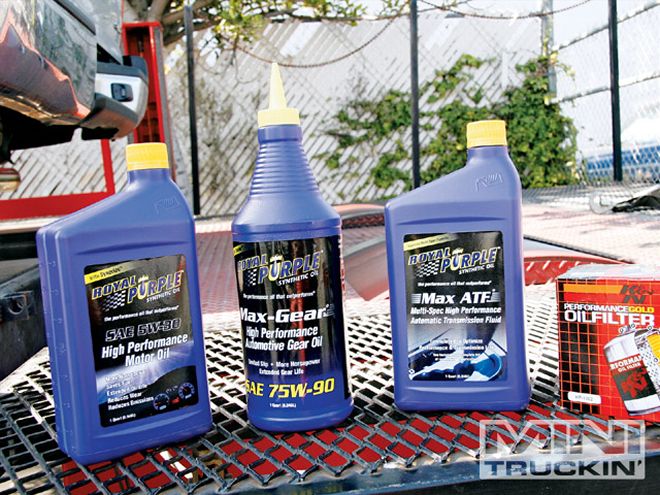
| conventional Vs Synthetic Oil three Oil
You've heard it before. Oil is the lifeblood of your engine. The purpose of motor oil is to lubricate and protect your engine from heat and friction; the two major enemies of your engine. Without oil, your engine would overheat and cease working. Your engine might even crack. Motor oil may be the single most important fluid you will put in your engine.
What Is Petroleum Oil?Crude oil, better known as petroleum oil, is pumped from the earth, refined, and sold as a lubricant. In spite of the refining process, which is imperfect, contaminants that are not beneficial for your engine will be introduced using petroleum motor oil. Petroleum motor oils contain a different-sized molecular structure that contains properties both beneficial and non-beneficial. Petroleum motor oil has been the predominant automobile lubrication product for generations. If changed regularly, petroleum motor oil will provide a measure of protection for your engine, but not necessarily the best measure of protection.
What Are The Disadvantages Of Conventional Oil?* High oil temperature in excess of 240F will break down petroleum oils and cause oxidation, which in turn forms deposits, varnish, and increases wear.
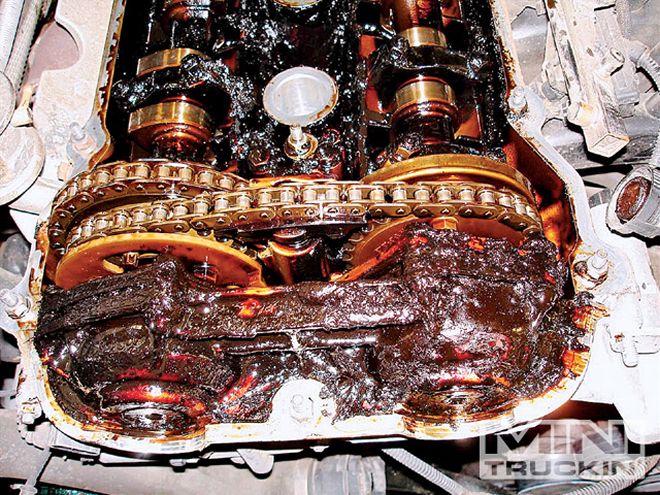
| conventional Vs Synthetic Oil engine
* Low oil temperatures will cause formation of sludge, which can block oil passages.
* Very low temperatures of -40F will make oil too thick to flow.
For dependable performance and long-term engine protection in all motor vehicles in all climatic conditions, petroleum oils must be supplemented with expensive additives that prolong the oil service life and reduce the wear to an acceptable level.
What Is Synthetic Oil?Synthetic motor oil is a laboratory manufactured, custom-designed product that contains a uniform-sized molecular structure and is pure from any of the non-beneficial properties found in conventional petroleum motor oils. Before being introduced to automobiles, synthetic oils were first used in fighter jets. Synthetic oils were first introduced to the consumer market in 1972 and have grown in popularity because of the superiority in protecting today's high performance engines.
What Are The Disadvantages Of Synthetic Oil?Quite simply, the biggest disadvantage of synthetic oil is price. With a manufacturing process that is much more involved, synthetic motor oil costs nearly four times the price of petroleum-based motor oil. This means an oil change that would typically cost $20, could cost nearly $80. However, since synthetics are more durable, oil changes are not needed as often, and this fact partially negates the cost disadvantage of synthetics.
Which is Better?Every year motor oil companies spend millions promoting their product; the majority of them petroleum motor oils. Although petroleum motor oil will provide adequate protection, there are some reasons why synthetic motor oil may be the better choice when it comes to protection for your engine. Why settle for adequate protection? Synthetic motor oils have clear advantages. Let us look at some of these advantages.
Longer Oil Change IntervalsUnlike petroleum motor oil, which must be changed every 3,000 to 5,000 miles, synthetic motor oil can go 6,000 to 10,000 miles between oil changes. Longer oil change intervals, means fewer trips to the lube shop or time spent underneath your truck.
Better For The EnvironmentBecause synthetic motor oil lasts about three times longer than petroleum motor oil, change intervals are significantly longer. Fewer oil changes reduce the waste-disposal problem that comes with changing your oil, which leads to a healthier, greener planet for all of us.
Higher Resistance To BreakdownPetroleum motor oils are prone to boil or vaporize within the normal operating temperature of the engine. This is commonly referred to as breakdown. Once the oil begins to breakdown, it usually results in oxidation, creating hardened oil deposits -more commonly know as sludge- in your engines components. Synthetics by contrast, are able to withstand greater heat temperatures, resulting in greater protection against breakdown.
More Cost EffectiveA typical oil change using petroleum motor oil may cost anywhere from $25 to $30 at your local oil change shop. Using synthetic motor oil will cost you approximately $75 per oil change. While synthetic motor oil may cost you more per quart, it will save you money in the long run because of longer oil change intervals.
Provides Superior Heat ProtectionHeat is a major enemy of any engine. Heat produces friction, and friction produces wear, and wear reduces the life of your engine. The uniformly smooth structure of synthetic motor oil, free of the contaminates found in conventional petroleum motor oil, provides superior protection against heat, friction, and wear on your engine.
Provides Superior Start-up ProtectionPetroleum motor oils contain waxes and paraffins which can thicken when exposed to cold temperatures. Cold petroleum oil makes it difficult for the oil to get from the oil pan to the moving parts of your engine during cold-weather start-ups. Meanwhile, until the oil heats up and is fluid enough to circulate through your engine, damage is occurring to your engine, which over time can reduce the life of your engine. Synthetic motor oil on the other hand, does not contain these waxes and has fluidity properties that allow it to get into your moving parts almost immediately, providing greater protection for your engine.

| 1.
The TestIt has already been determined that synthetic oils are cleaner than petroleum oils and have less damaging effects on the motor. We have also learned that synthetics -because they are cleaner- provide better lubricity for the motor. With this in mind, wouldn't you think that there would be another advantage to switching to synthetics? If the motor, transmission, and rearend are working easier because of the lubricity of synthetics, shouldn't we get more horsepower to the rear wheels?
We called up Stillen in Costa Mesa, California and made an appointment to take our '07 Toyota Tacoma down to its tech center and have the lifeblood of Average Joe changed over to Synthetic. Stillen's tech center is equipped to handle anything from suspension modifications to any motor upgrades you can think of. For a small fee, we used Stillen's chassis dyno to show the difference between petroleum oil and synthetic oil.
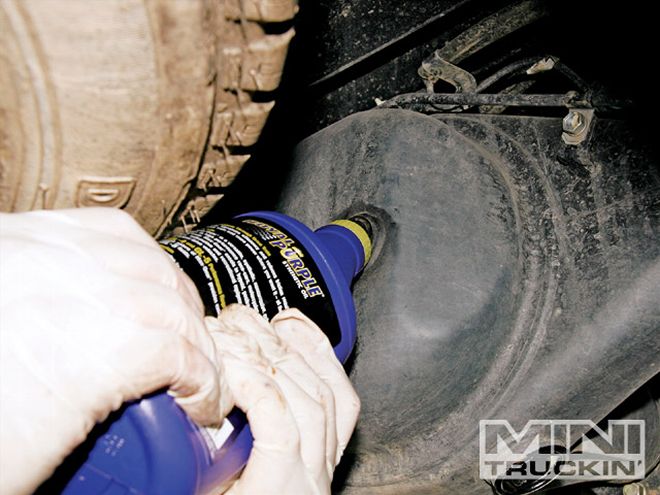
| 2.
1. To change all the fluids, Sam started draining the engine oil, then the transmission oil, and finally the differential oil. and 145.21ftlb of torque. That is a gain of 3.79hp and 4.47ftlb of torque and we are happy with that. That can be as much as some air intakes.
2. Starting with the differential we filled it with three quarts of Royal Purple's Max-Gear SAE 75w-90-gear oil. Moving back to the motor, Sam replaced the oil filter with K&Ns Performance Gold filter and filled the motor with 5.5 quarts of Royal Purple's SAE 5W-30 motor oil.
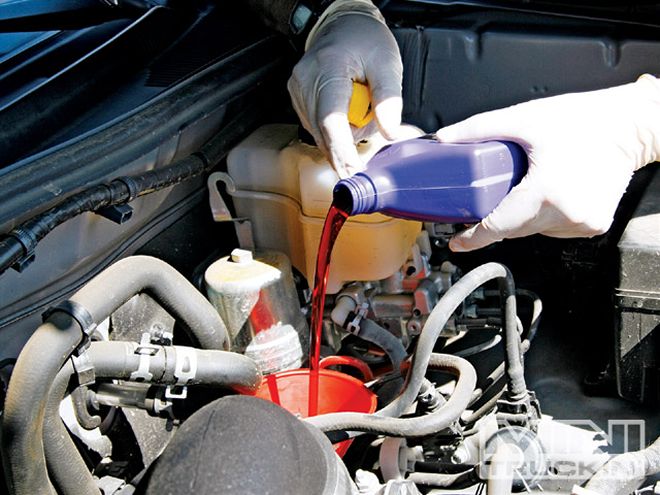
| 3.
3. Our Toyota came with the four-speed automatic transmission, so we were only able to drain about half of the oil in the system. In order to flush the system we refilled the transmission started the truck let it run, shifted through the gears for a few minutes, then drained the transmission again. At this point, there is less than 25 percent of the original oil left in the system. We could have repeated the process one more time, but at ten dollars a bottle, it could get pricey very quick. Once this was done, we started the truck and let it get up to operating temperature and checked to see if anything needed to be topped off.
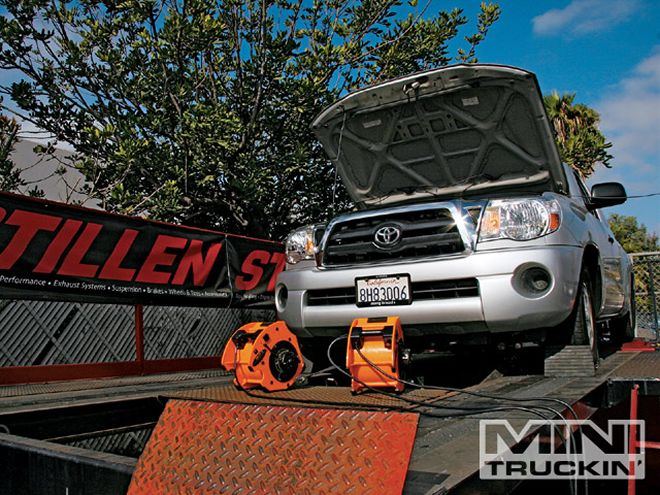
| 4.
(4. and 5.) Finally, it was time to see if our theory was correct. Before we changed the oil, the first round of dyno pulls scored us 129.17hp and 140.74ftlb of torque. After the oil change, we did another series of dyno pulls and we made 132.96hp and 145.21ftlb of torque. That is a gain of 3.79hp and 4.47ftlb of torque and we are happy with that. That can be as much as some air intakes.
ConclusionMost conventional petroleum motor oils will provide adequate protection for your automobile's engine, but wouldn't you like your car, one of the most expensive investments you'll make, to have the absolute best protection available?
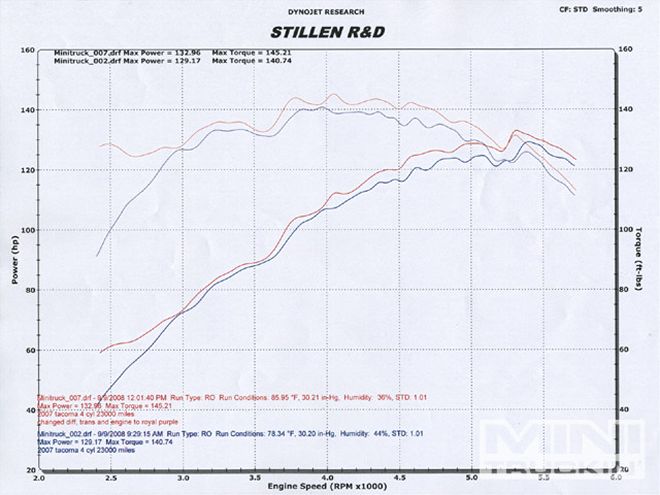
| 5.
The LowdownParts Used: Royal Purple synthetic oils
Parts' Cost: $188.79
5w30 motor oil - 6x$6.49 per quart
Max ATF transmission fluid - 12x$9.99 per quart
Max Gear gear oil - 3x$9.99 per quart
Company: Royal Purple
Contact Info: royalpurple.com
Company: K&N Engineering, Inc.
Contact Info: knfilters.com
Installation: Stillen
Contact info: stillen.com, (866) 250-5542
Approximate Installation Time: 1.5 hours
Skills required: Minimal
Tools used: General mechanics tools, oil filter removal tool, funnel, and shop towels
 | conventional Vs Synthetic Oil three Oil
You've heard it before. Oil is the lifeblood of your engine. The purpose of motor oil is to lubricate and protect your engine from heat and friction; the two major enemies of your engine. Without oil, your engine would overheat and cease working. Your engine might even crack. Motor oil may be the single most important fluid you will put in your engine.
What Is Petroleum Oil?
| conventional Vs Synthetic Oil three Oil
You've heard it before. Oil is the lifeblood of your engine. The purpose of motor oil is to lubricate and protect your engine from heat and friction; the two major enemies of your engine. Without oil, your engine would overheat and cease working. Your engine might even crack. Motor oil may be the single most important fluid you will put in your engine.
What Is Petroleum Oil? | conventional Vs Synthetic Oil engine
* Low oil temperatures will cause formation of sludge, which can block oil passages.
* Very low temperatures of -40F will make oil too thick to flow.
For dependable performance and long-term engine protection in all motor vehicles in all climatic conditions, petroleum oils must be supplemented with expensive additives that prolong the oil service life and reduce the wear to an acceptable level.
What Is Synthetic Oil?
| conventional Vs Synthetic Oil engine
* Low oil temperatures will cause formation of sludge, which can block oil passages.
* Very low temperatures of -40F will make oil too thick to flow.
For dependable performance and long-term engine protection in all motor vehicles in all climatic conditions, petroleum oils must be supplemented with expensive additives that prolong the oil service life and reduce the wear to an acceptable level.
What Is Synthetic Oil?


 | 1.
The Test
| 1.
The Test | 2.
1. To change all the fluids, Sam started draining the engine oil, then the transmission oil, and finally the differential oil. and 145.21ftlb of torque. That is a gain of 3.79hp and 4.47ftlb of torque and we are happy with that. That can be as much as some air intakes.
2. Starting with the differential we filled it with three quarts of Royal Purple's Max-Gear SAE 75w-90-gear oil. Moving back to the motor, Sam replaced the oil filter with K&Ns Performance Gold filter and filled the motor with 5.5 quarts of Royal Purple's SAE 5W-30 motor oil.
| 2.
1. To change all the fluids, Sam started draining the engine oil, then the transmission oil, and finally the differential oil. and 145.21ftlb of torque. That is a gain of 3.79hp and 4.47ftlb of torque and we are happy with that. That can be as much as some air intakes.
2. Starting with the differential we filled it with three quarts of Royal Purple's Max-Gear SAE 75w-90-gear oil. Moving back to the motor, Sam replaced the oil filter with K&Ns Performance Gold filter and filled the motor with 5.5 quarts of Royal Purple's SAE 5W-30 motor oil.
 | 3.
3. Our Toyota came with the four-speed automatic transmission, so we were only able to drain about half of the oil in the system. In order to flush the system we refilled the transmission started the truck let it run, shifted through the gears for a few minutes, then drained the transmission again. At this point, there is less than 25 percent of the original oil left in the system. We could have repeated the process one more time, but at ten dollars a bottle, it could get pricey very quick. Once this was done, we started the truck and let it get up to operating temperature and checked to see if anything needed to be topped off.
| 3.
3. Our Toyota came with the four-speed automatic transmission, so we were only able to drain about half of the oil in the system. In order to flush the system we refilled the transmission started the truck let it run, shifted through the gears for a few minutes, then drained the transmission again. At this point, there is less than 25 percent of the original oil left in the system. We could have repeated the process one more time, but at ten dollars a bottle, it could get pricey very quick. Once this was done, we started the truck and let it get up to operating temperature and checked to see if anything needed to be topped off.
 | 4.
(4. and 5.) Finally, it was time to see if our theory was correct. Before we changed the oil, the first round of dyno pulls scored us 129.17hp and 140.74ftlb of torque. After the oil change, we did another series of dyno pulls and we made 132.96hp and 145.21ftlb of torque. That is a gain of 3.79hp and 4.47ftlb of torque and we are happy with that. That can be as much as some air intakes.
Conclusion
| 4.
(4. and 5.) Finally, it was time to see if our theory was correct. Before we changed the oil, the first round of dyno pulls scored us 129.17hp and 140.74ftlb of torque. After the oil change, we did another series of dyno pulls and we made 132.96hp and 145.21ftlb of torque. That is a gain of 3.79hp and 4.47ftlb of torque and we are happy with that. That can be as much as some air intakes.
Conclusion | 5.
The Lowdown
| 5.
The Lowdown